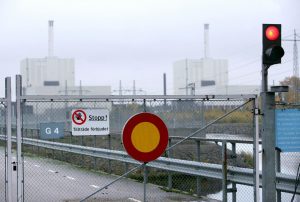155 Global News Post 1
Grace Weems
Sweden Approves Nuclear Waste Storage Site
by Charlie Duxbury

Fredrik Sandberg. [Forsmark nuclear power plant]. (2022). https://www.politico.eu/article/sweden-approve-nuclear-waste-storage-site/
This article details Sweden’s decision to continue with a storage plan for nuclear waste. This action makes Sweden only the second country to go through with a plan for storing nuclear waste, Finland being the first. Annika Strandhäll, Sweden’s environmental minister, has announced this facility will be built on the coast near the Forsmark nuclear power plant. The method is called “KBS3” and ensures that nuclear waste is stored in copper containers that are then surrounded by bentonite clay. These containers are then placed throughout 500 tunnels that run 500 meters under the ground.
Duxbury claims that this step solidifies Sweden’s position as the global leader of nuclear waste storage. Despite Finland doing the project first, the Finnish plan was developed based on a process from Swedish researchers. Furthermore, Strandhäll and the Swedish Radiation Safety Authority both assure that the methods to be used are safe following criticisms that the use of copper is not resistant enough to corrosion. Sweden claims that this method will make sure the nuclear waste is isolated for at least 100,000 years. Last year, the plan became so important that two opposing parties pressured the government in making a decision. Some fear that the plan was too rushed due to this pressure, and more time was needed to research. Strandhäll claims that the issue of nuclear waste storage cannot be pushed back any further.
Duxbury’s article praises Sweden and their progressive action towards the storage of nuclear waste and hails them as global leaders. He does bring up critics who fear the method is not secure enough but assures the audience that experts believe the method to be safe. He appreciates Sweden’s long-running goal to create a storage plan for nuclear waste, a plan Swedish authorities have been considering since the 1970s, but takes into account the concerns about the plan’s method and rushed development.